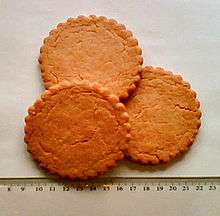Jodenkoek
 | |
| Place of origin | Netherlands |
|---|---|
|
| |
A jodenkoek (in Dutch, literally "Jew cookie", plural jodenkoeken) is a big, flat, round shortbread cookie with a diameter of about 10 centimeters.
History
Claimed to have been first baked in the 17th century,[1] these cookies were advertised by bakeries as early as 1872.[2] Jodenkoeken were made famous by a baker called Davelaar, in Alkmaar, Netherlands. The Stam bakery in Alkmaar started selling jodenkoeken in 1883,[3] and Dirk Davelaar took over this bakery in 1924. By advertising in local newspapers and by offering the cookies through other stores, his jodenkoeken became a popular product. The company continues to bake them to this day. Similar products with the same name are produced by Lotus Bakeries and O'Lacy.
Etymology
Some producers still use the old name, jodekoek, while others have changed the name of the product to jodenkoek, after the new orthography of the Netherlands from 1996.
There are four different stories about the name of the cookies:
- Lotus Bakeries claims that the recipe originates from a Jewish baker in Amsterdam who sold the cookies around 1920. This baker sold the recipe to a bakery in Enkhuizen.[4]
- A baker with surname ‘de Joode’ baked the cookies.[4]
- Jodenkoeken are big but very flat, making it a cheap product to produce. A lot of cheap products got the prefix Jewish in the past. A lot of Jews were poor, making it likely that they bought cheaper things because it was necessary.[4]
- The last story associates the cookie with the unleavened bread baked by the Jews of ancient Egypt at the time of the exodus. The connection is made by the physical properties that both the cookies and unleavened bread have in common: they are both flat, crunchy and have a very low moisture content, resulting in a long shelf-life.
In the 1970s the name was thought to be discriminatory by some, and the manufacturer considered changing it, but ultimately decided against it.[4] Jodenkoeken are exported to England and China, but, because of the difficulty of the name explanation, the export product is called Dutch Cookies.[5]
Package
In the beginning the cookies were sold in iron tin-plates with a yellow wrapper. Now jodenkoeken can also be bought in plastic tins with a purple wrapper. Because the cookies are in a tin-plate, they are packed air-tight so they remain fresh and crunchy.
References
External links
- Website of producer Davelaar Koeken, Amarant Bakkersholding B.V.
- Website of producer Van Dijk Banket B. V
- goeievraag.nl, origin of the word